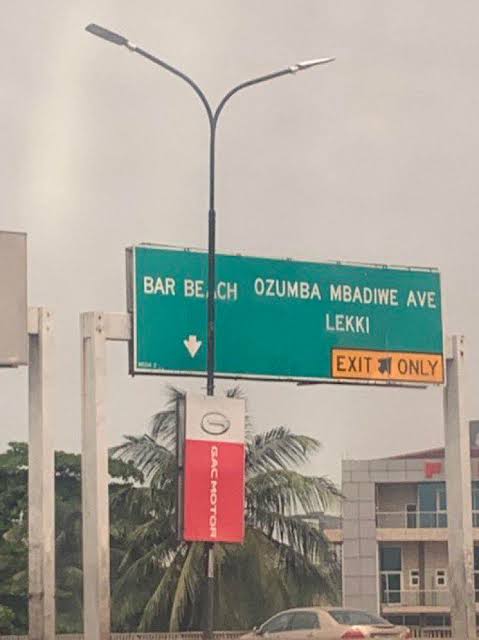
Relief in Sight as Lagos Government Moves to Repair Ozumba Mbadiwe Road for Smoother Victoria Island–Lekki Commute

In what comes as welcome news to thousands of commuters and motorists, the Lagos State Government has announced that it will commence repairs on the ever-busy Ozumba Mbadiwe Road from September 15 to 21, in a determined effort to ease travel time and restore sanity along the stretch that serves as a crucial gateway between Victoria Island and Lekki. For many who have endured daily gridlock, pothole-induced delays, and stressful rides on one of Lagos’ most important arteries, the declaration feels like long-awaited relief at last, even as concerns linger about how traffic diversions will be managed during the period of construction.
Ozumba Mbadiwe Road is not just another roadway in Lagos; it is a lifeline of commerce, social activity, and connectivity. Every day, corporate executives, government officials, entrepreneurs, ride-hailing drivers, luxury car owners, and bus commuters alike pour onto the stretch that links the commercial hub of Victoria Island with the rapidly growing urban belt of Lekki. The road also serves as a vital channel for those heading further towards Ajah and Epe, areas now witnessing real estate booms and expanding residential settlements. Yet, despite its status, the road has long suffered from wear and tear caused by heavy daily usage, flooding during rainy seasons, and inadequate maintenance. Motorists have often complained that sections of the road had become riddled with potholes that slowed traffic to a crawl, damaged vehicles, and worsened congestion that was already legendary.
The announcement by the state government is therefore being greeted with cautious optimism. According to the statement released by the Lagos State Ministry of Works and Infrastructure, the rehabilitation will be carried out within a one-week window, spanning September 15 to 21, with contractors mobilized to work both day and night shifts to ensure timely completion. The government explained that the goal is not only to repair visible damage but also to reinforce the road to withstand the intense daily pressure from cars, buses, and heavy-duty trucks. Special emphasis, the ministry added, would be placed on improving drainage along the stretch to reduce the flooding that frequently leaves the road waterlogged during heavy rains, a problem that has often accelerated deterioration.
For regular commuters, this intervention could mean the difference between spending hours in bottlenecked traffic and enjoying a smoother ride across the corridor. Victoria Island is the financial heartbeat of Lagos, hosting numerous multinational corporations, banks, luxury hotels, embassies, and government agencies, while Lekki has transformed into a bustling district of tech startups, entertainment firms, estates, and recreational hubs. The constant exchange of human and economic traffic between the two areas means that delays on Ozumba Mbadiwe are more than an inconvenience—they translate directly into lost man-hours, reduced productivity, missed appointments, and even strained personal schedules. Businesses have often lamented how unpredictable travel time between Lekki and Victoria Island has become, with some employees resorting to leaving home at unusually early hours just to beat the traffic nightmare.
The government’s intervention, though temporary in duration, signals a recognition of the urgency of the matter. Lagos State Commissioner for Transportation, in comments to journalists, emphasized that the administration of Governor Babajide Sanwo-Olu remains committed to keeping Lagos moving, despite the daunting challenges of urban expansion and infrastructural strain. He acknowledged that the works may cause short-term inconveniences but appealed for cooperation from road users, assuring that alternative routes and traffic officers would be deployed to ease the expected congestion during the repair period. According to him, patience and discipline from motorists will go a long way in ensuring the project is completed seamlessly.
However, Lagosians are known for their skepticism when it comes to road repairs, having witnessed countless projects announced with fanfare but either left incomplete, poorly executed, or riddled with delays. Some commuters expressed cautious enthusiasm, saying they would wait to see if the September 21 deadline would indeed be met. For others, the fear is that traffic during the one-week period could become unbearable, especially if diversions are poorly managed. Many still recall the gridlock chaos that erupted during previous repairs on key roads such as the Third Mainland Bridge and Eko Bridge. Yet optimists believe that if the state executes its plan effectively, the pain of temporary congestion would be worth the long-term benefit of a smoother and faster road network.
The timing of the repair is also significant. With Lagos entering the last quarter of the year, activities typically intensify as businesses rush to wrap up projects, festive shopping increases, and social events peak. The Victoria Island–Lekki corridor is at the center of this heightened activity, with its upscale malls, restaurants, nightlife spots, and beaches drawing both locals and tourists. A well-repaired Ozumba Mbadiwe Road could therefore enhance the city’s image, reduce road rage, and even contribute to the broader push for Lagos to remain attractive to investors and expatriates who often complain about the city’s traffic headaches.
Experts in urban planning have also weighed in, noting that while the one-week rehabilitation is commendable, Lagos requires a holistic and sustainable road maintenance strategy. They argue that patchwork repairs, while temporarily useful, must be followed by continuous monitoring, preventive maintenance, and investment in durable road technology to prevent a quick return to deterioration. Some also pointed out that without addressing the root causes of flooding, drainage blockages, and reckless overloading by trucks, repaired roads may not last as long as intended. Civil engineers have called for stricter enforcement of weight limits, better drainage infrastructure, and more coordinated urban planning to match the pace of Lagos’ explosive population growth.
Nevertheless, the news of the planned repair has already sparked relief in many quarters. Ride-hailing drivers who ply the route daily expressed hope that they would spend less money on car repairs caused by pothole damage, while commercial bus drivers welcomed the prospect of faster trips that would allow them to make more runs and increase earnings. Corporate workers, who often leave Lekki as early as 5 a.m. to get to offices on Victoria Island by 8 a.m., said the repairs could shave precious minutes off their exhausting commutes. For residents, smoother travel also promises better access to healthcare, schools, and recreational facilities on both sides of the corridor.
The Lagos State Government has promised regular updates throughout the repair period and has urged residents to follow official channels for information on traffic advisories and diversions. Security personnel, traffic wardens, and LASTMA officials are expected to be on the ground to manage the situation and prevent chaos. With proper planning and execution, the week-long repair could serve as a model for how the state approaches urgent infrastructural fixes in the future, blending speed with efficiency.
As the September 15 start date approaches, the spotlight will remain firmly on Ozumba Mbadiwe Road, its commuters, and the government’s contractors. Lagosians will be watching closely to see whether this intervention delivers the relief so many have yearned for, or whether it becomes another case of promises made but not fully kept. But one thing is certain: for now, hope rides high that come September 21, the iconic stretch connecting Victoria Island and Lekki will be smoother, safer, and swifter to navigate, making life in the bustling metropolis just a little bit easier.


